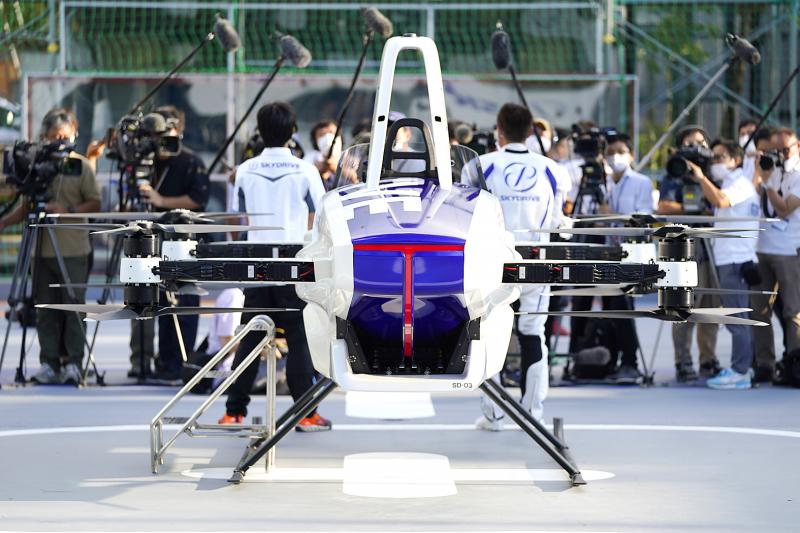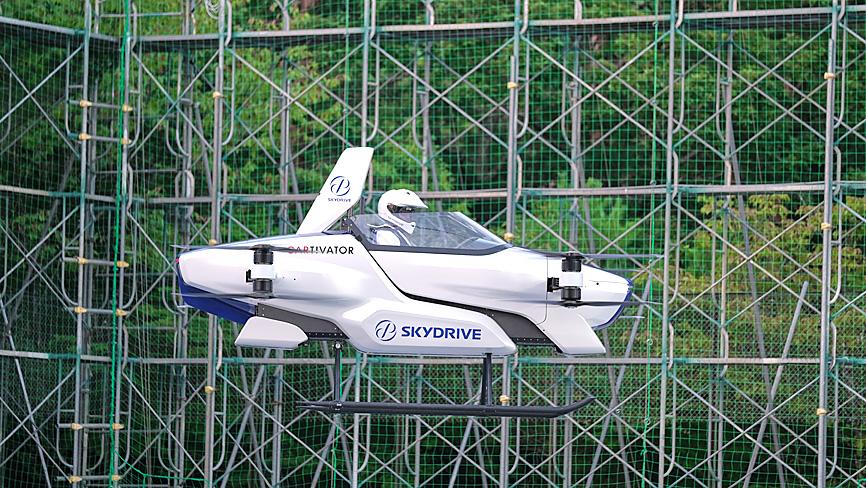The decades-old dream of zipping around in the sky as simply as driving on highways could be becoming less illusory.
Japan’s SkyDrive Inc, among the myriads of “flying car” projects around the world, has carried out a successful though modest test flight with one person aboard.
In a video shown to reporters on Friday, a contraption that looked like a slick motorcycle with propellers lifted 1m to 2m off the ground, and hovered in a netted area for four minutes.

Photo: Bloomberg
SkyDrive chief executive Tomohiro Fukuzawa said he hopes that “the flying car” can be made into a real-life product by 2023, but added that making it safe was critical.
“Of the world’s more than 100 flying car projects, only a handful has succeeded with a person on board,” he said. “I hope many people will want to ride it and feel safe.”
The machine so far can fly for just five to 10 minutes, but if that could become 30 minutes, it would have more potential, including exports to places such as China, Fukuzawa said.

Photo: Reuters / SkyDrive / CARTIVATOR 2020
Unlike airplanes and helicopters, electric vertical takeoff and landing (eVTOL) vehicles offer quick point-to-point personal travel, at least in principle.
They could do away with the hassle of airports and traffic jams, and the cost of hiring pilots. They could fly automatically.
Battery sizes, air traffic control and other infrastructure issues are among the many potential challenges to commercializing them.
“Many things have to happen,” said Sanjiv Singh, professor at the Robotics Institute at Carnegie Mellon University, who cofounded Near Earth Autonomy, near Pittsburgh, Pennsylvania, which is also working on an eVTOL aircraft.
“If they cost US$10 million, no one is going to buy them. If they fly for five minutes, no one is going to buy them. If they fall out of the sky every so often, no one is going to buy them,” Singh said in a telephone interview.
The SkyDrive project began humbly as a volunteer project called Cartivator in 2012, with funding by top Japanese companies including automaker Toyota Motor Corp, electronics company Panasonic Corp and video game developer Bandai Namco.
A demonstration flight three years ago went poorly, but it has improved and the project recently received another round of funding of ¥3.9 billion (US$37 million), including from the Development Bank of Japan.
The Japanese government is bullish on “the Jetsons” vision, with a “road map” for business services by 2023, and expanded commercial use by the 2030s, stressing its potential for connecting remote areas and providing lifelines in disasters.
Experts compare the buzz over flying cars to the days when the aviation industry got started with the Wright brothers and the auto industry with the Ford Model T.
Lilium of Germany, Joby Aviation in California and Wisk Aero, a joint venture between Boeing Co and Kitty Hawk Corp, are also working on eVTOL projects.
Kitty Hawk chief executive Sebastian Thrun said that it took time for airplanes, cellphones and self-driving vehciles to win acceptance, “but the time between technology and social adoption might be more compressed for eVTOL vehicles.”

UNCERTAINTY: Innolux activated a stringent supply chain management mechanism, as it did during the COVID-19 pandemic, to ensure optimal inventory levels for customers Flat-panel display makers AUO Corp (友達) and Innolux Corp (群創) yesterday said that about 12 to 20 percent of their display business is at risk of potential US tariffs and that they would relocate production or shipment destinations to mitigate the levies’ effects. US tariffs would have a direct impact of US$200 million on AUO’s revenue, company chairman Paul Peng (彭雙浪) told reporters on the sidelines of the Touch Taiwan trade show in Taipei yesterday. That would make up about 12 percent of the company’s overall revenue. To cope with the tariff uncertainty, AUO plans to allocate its production to manufacturing facilities in

TAKING STOCK: A Taiwanese cookware firm in Vietnam urged customers to assess inventory or place orders early so shipments can reach the US while tariffs are paused Taiwanese businesses in Vietnam are exploring alternatives after the White House imposed a 46 percent import duty on Vietnamese goods, following US President Donald Trump’s announcement of “reciprocal” tariffs on the US’ trading partners. Lo Shih-liang (羅世良), chairman of Brico Industry Co (裕茂工業), a Taiwanese company that manufactures cast iron cookware and stove components in Vietnam, said that more than 40 percent of his business was tied to the US market, describing the constant US policy shifts as an emotional roller coaster. “I work during the day and stay up all night watching the news. I’ve been following US news until 3am

COLLABORATION: Given Taiwan’s key position in global supply chains, the US firm is discussing strategies with local partners and clients to deal with global uncertainties Advanced Micro Devices Inc (AMD) yesterday said it is meeting with local ecosystem partners, including Taiwan Semiconductor Manufacturing Co (TSMC, 台積電), to discuss strategies, including long-term manufacturing, to navigate uncertainties such as US tariffs, as Taiwan occupies an important position in global supply chains. AMD chief executive officer Lisa Su (蘇姿丰) told reporters that Taiwan is an important part of the chip designer’s ecosystem and she is discussing with partners and customers in Taiwan to forge strong collaborations on different areas during this critical period. AMD has just become the first artificial-intelligence (AI) server chip customer of TSMC to utilize its advanced

Six years ago, LVMH’s billionaire CEO Bernard Arnault and US President Donald Trump cut the blue ribbon on a factory in rural Texas that would make designer handbags for Louis Vuitton, one of the world’s best-known luxury brands. However, since the high-profile opening, the factory has faced a host of problems limiting production, 11 former Louis Vuitton employees said. The site has consistently ranked among the worst-performing for Louis Vuitton globally, “significantly” underperforming other facilities, said three former Louis Vuitton workers and a senior industry source, who cited internal rankings shared with staff. The plant’s problems — which have not